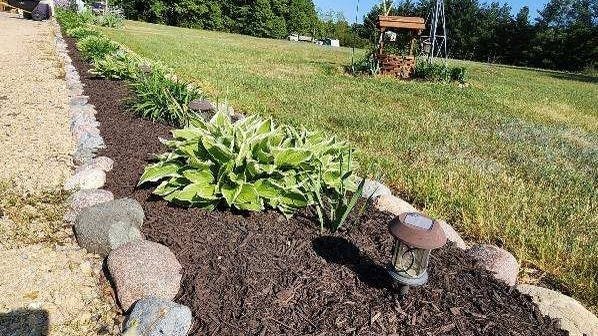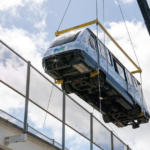When Joe and Sara Carstensen first got a hold of their lot, it was nothing but sand and weeds.
But Joe loved to get his hands dirty, and Sara loved plants, so they started working the ground. As their humble yard in the rural village of Lone Rock blossomed — green grass, flowers, even trees that would usually die each brutal winter — people took notice. By 2021, Joe was working a side landscaping business that’s taken nights, weekends, and “vacation time” ever since.
“I just work every day,” Joe, 37, said. “Working for myself is what I’ve always wanted to do.”
After growing up with nothing in homes wracked by addiction, for the Carstensens building a small business is about more than money. They’re not alone. In fact, entrepreneurship is much more common in our rural economy than our urban economy, a reality that’s too little-known and completely lost on our political leaders, leaving behind an entire class of people despite the “supporting small business” empty talk that’s so common this time of year.
There are more entrepreneurs in rural areas than cities
More than 17 million people are considered self-employed in the United States, including small business owners or contractors without incorporated businesses. Data shows they’re far likelier to live in rural areas (one study showed rural counties nearly nine times more likely to have a high concentration of people working for themselves), but that they’ve been declining as rural areas struggle. Many work multiple jobs, like the Carstensens (Joe at the local cheese factory, Sara at the local bank).
If entrepreneurship being more common in rural areas than urban areas feels surprising, set aside visions of Silicon Valley for a moment. Consider that in cities and suburbs, there are countless established companies to meet consumer needs of all kinds, and to employ the people who do the work. In rural areas where economic growth has often stalled, solo operations fill in gaps, from landscapers to mechanics, hairdressers, carpenters, in-home caretakers, plumbers, electricians, and more.
It’s also a natural outgrowth of the historic hardship and incredible resilience that define rural life: farm families losing the farm but still wanting to work for themselves, factory workers finding steady shifts harder to come by and turning to side work like pouring concrete or building homes, and so on.
The life of the rural entrepreneur holds both unexpected hope, and unknown hardship.
Self-employment offers path to better future for family
I grew up knowing Joe, and what began as side income is turning into a generational step up the economic ladder. After tough childhoods impacted by drug and alcohol abuse and sometimes even lack of money for food, the Carstensens have a growing business. Most important, their teenage son, Austin, can hold his head up a little higher—and see more on the horizon.
“We just wanted better for our kids,” Sara, 36, said. “That does give us a lot of pride, because he’s going to have opportunities we never got. That’s what drives us.”
But the challenges facing these rural entrepreneurs are many. And they’re often unseen or misunderstood, making both political parties guilty of lip-service because of how good our country has become at talking about “small business.”

Democrats have plenty of government programs to aid rural economic development, but fail to realize how the tax burden legitimately alienates small businesses. Rather than rarely seeing the money withheld from their paychecks like urban workers, rural entrepreneurs are often told by accountants to write checks of up to 40 percent of their income to the government.
Republicans have plenty of ideas for ways to cut regulations or taxes, but fail to understand how lax antitrust policy traps small businesses. Massive corporate entities, with their far-off decision makers and massive scale, send money made locally back to their corporate HQs, and often won’t work with small businesses. And if they’re big enough, they can restrict their own competition and unfairly drive locals out of business.
That’s before we even get into infrastructure, health care access, or other issues.
Meantime, the Carstensens are hoping to build their business enough to stop working multiple jobs. Sara said they could do it sooner if political leaders would actually “consider us little guys for a second.”
But they’re grateful for the home they can come back to these days—the nice lawn they seeded themselves, with rocks lining the walkways and flower beds and deck. They have a greenhouse, and the trees they’ve planted are standing strong.
They just hope they’re growing something that can last.
Brian Reisinger is a writer who grew up on a family farm in Sauk County. He contributes in-depth columns and videos for the Ideas Lab at the Journal Sentinel, and is the author of“Land Rich, Cash Poor: My Family’s Hope and the Untold History of the Disappearing American Farmer.” Reisinger works in public affairs consulting for Wisconsin-based Platform Communications. He splits his time between a small town in northern California near his wife’s family, and his family’s farm here in Wisconsin.












